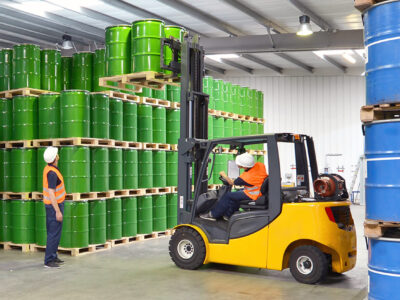
Jobs with relevance
No manufacturing company and no trading company can do without qualified, reliable and committed employees who master the inventory management processes in the warehouse. Warehouse clerks or specialists in warehouse logistics are the experts for incoming goods, outgoing goods and storage.
Find the ideal warehouse job here!

The warehouse is the heart of a company
The job of a warehouse employee is not as one-dimensional as it might appear at first glance. It’s not just about the actual storage and retrieval processes, general knowledge of merchandise management, logistics, purchasing and quality assurance is also required.
After all, the management of a warehouse primarily ensures the production and delivery readiness of a company. The employees ensure that there are sufficient quantities of production materials in the warehouse, which guarantees a trouble-free and uninterrupted production process. Finished products should also be available in sufficient quantities in the warehouse in order to be able to reliably supply buyers or customers, whether on the basis of regular supply or after receipt of an order or order.
In all of this, the focus must always be on the profitability of the warehouse because keeping goods and products in stock causes high storage and logistics costs. At the same time, however, there is a risk of losses if e.g. in the food sector, perishable goods remain in the warehouse for too long or if the warehouse capacity for storing finished products is no longer sufficient. The possibility of external warehouse management would then be offered here, but this is associated with additional costs.
The central functions of a warehouse are also reflected in the main activities of the respective employees:
- Registration and documentation of goods or raw materials in goods receipt
- Checking the quantity and quality based on the accompanying documents
- unloading of the goods
- Allocation of a storage location, also supported by a warehouse management system
- Accommodation of the object to be stored
- Outsourcing of individual items either for consumption in production and assembly or based on customer orders
- Picking, partly based on route plans that were created in the disposition
- Preparation of the accompanying documents for shipping
- Packing and preparation in goods issue
- Loading of trucks, containers or railway wagons
- Securing the goods against slipping or leaking
- If returns are incurred, they must be recorded, checked and stored again
- Inventory support to compare actual and target stocks
High requirements on employees
For the activities in the camp you should bring a good physical constitution, because it has to be worked in unheated, draughty or year-round cold halls. In addition, organizational skills and diligence are required in order to be able to allocate the right storage locations even at stressful times of the day, and to pick deliveries for dispatch or removal for production with as few errors as possible. You also have to work with caution and a sense of responsibility in the warehouse, because expensive conveyor systems, forklifts and hoists are used here.
The risk of accidents at work must also always be kept low by carefully observing the processes and specifications, because after all, e.g. B. Hazardous substances are transported and stored. Safety and health protection are not the only elementary components of work in the warehouse. Recently, topics such as environmental protection and sustainability have also become increasingly important, and the warehouse has not been spared from the change towards an increasingly digitized working world that can be felt everywhere.
Warehouse management systems
The digitization of warehouse processes began a couple of years ago. In many cases, the days of daily inventory checks by employees and based on simple tables are over.
Modern warehouse management systems are the heart of every warehouse. These are basically inventory-managed systems that always map and manage the dependencies between the quantitative stocks and the actual storage locations in real time. With such a system, not only can inventory be managed, but material flow movements can also be controlled. It can namely contribute to the fact that cost-intensive production plants are continuously utilized according to the production planning. This means that bottlenecks, which in the worst case could lead to an interruption in production, are basically ruled out.
Warehouse management software makes it possible to automatically link raw, auxiliary and operating materials as well as finished goods to order management. In this way, the employees in the order acceptance department or during the processing of customer inquiries can immediately see whether the required goods or means of production are available in sufficient quantities on site.
Other advantages can also be interfaces with accounting. This ensures that the actual stocks match the posted ones. This high level of reliability can only be impaired by accidental incorrect picking by the warehouse staff or by intentional actions such as theft.
On the one hand, a warehouse management system creates more transparency for the company and management, and on the other hand, time-consuming searches are no longer necessary for the employees in the warehouse. The buyers or customers hear an increased delivery quality, since picking errors by the employees z. B. reduced by using pick-by-voice or pick-by-light solutions. Furthermore, these digital systems enable chaotic storage space management, paperless picking and permanent inventory to be implemented. RFID-based applications and an optimized forklift control can be implemented in further steps, as well as the creation of interfaces for the connection to higher-level ERP systems or to a material flow computer that controls all flows of goods.

